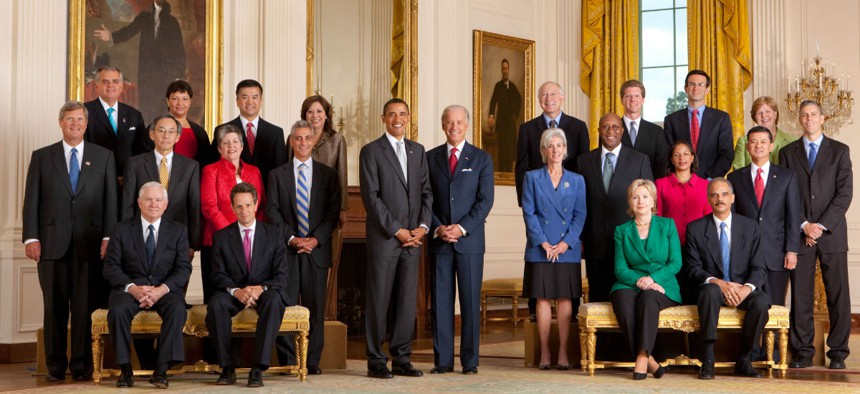
President Obama poses with his cabinet in 2009. He sought to create a more diverse federal workforce, starting at the top. Official White House Photo by Chuck Kennedy
Obama Seeks to Cement Agency Diversity Efforts Before Trump Takes Office
Leaders emphasize the importance of inclusion across the federal workforce.
As President-elect Donald Trump prepares to take control of the executive branch, the Obama administration is looking to institutionalize the progress it has made in building diversity priorities into hiring and everyday government practices.
The White House is hosting a multi-day event that kicked off Monday to share best practices and emphasize the importance of inclusion at all levels of federal agencies. Officials including Office of Management and Budget Director Shaun Donovan, Office of Personnel Management acting Director Beth Cobert and chief of staff to First Lady Michelle Obama and assistant to President Obama Tina Tchen expressed their pride in what the administration has accomplished and the importance of building on that momentum as Trump takes office.
The Summit on Diversity and Inclusion in Government followed the work of a council created by Obama in a 2011 executive order to bring more people from a wider array of backgrounds into the federal workforce. In addition to administration officials, private sector companies, academic researchers and advocacy groups addressed the federal personnel gathered at the White House. Cobert instructed them to move beyond training to instead ensure in the closing weeks of Obama’s term that diversity is “being built into the fabric of all business functions” in government.
She noted specific success stories, such as the Agriculture Department's use of blind applications in hiring. As a result, the department increased the number of women in Senior Executive Service positions by 50 percent. In addition, agencies exceeded Obama’s goal of hiring more than 100,000 disabled individuals in government over five years.
Passing that milestone “didn’t stop with a celebration,” Cobert said, adding that agencies should continue to press ahead on diversity efforts underway as the Obama administration comes to an end.
Donovan said managers should commit to hiring diverse teams, noting that hearing different perspectives made him better at his job. He also advocated agencies work together to find common solutions to shared problems.
“This is something that drives me nuts about government,” Donovan said. “So often we have each individual agency working on their own, in their own silo. The fact is -- particularly when it comes to an issue like diversity -- there are a lot of similar challenges.”
He added there was no reason each agency should try to reinvent the wheel, and in many cases, “innovation” should simply mean “theft.”
“The idea that each of us would try to solve these challenges alone doesn’t make any sense,” Donovan said.
Elizabeth Sherwood-Randall, the Energy Department’s deputy secretary, said the “experience of our nation” this past summer forced the organization’s leadership to examine “what we can do together.” That led to informal listening sessions with herself and Secretary Ernest Moniz and rank-and-file employees, who reported they would not work at an agency without a commitment to diversity. This provided a wake-up call to the department, she said.
“Self-interest is a good motivator if doing the right thing is not,” Sherwood-Randall said. She added leadership would have to drive diversity initiatives, and the efforts must be lead “by those who have been included in their life experiences” rather than historically excluded groups.
A.J. Jones II, the chief policy and communications officer for the W.K. Kellogg Foundation, said what administration officials could not, making direct references to Trump’s appointments and promises. He stressed the importance of having difficult conversations, saying federal employees should ask Sen. Jeff Sessions, R-Ala., who Trump has tapped to serve as his attorney general, how he “feels about diversity in the workforce.” He noted inclusion in Trump’s administration would be important, as he “can’t do great deals with China” if he has no one of Chinese descent in his administration.
Sherwood-Randall admitted agencies are facing a “ticking clock” to build diversity efforts into their core missions. She said agencies across government are preparing a report for the Trump transition team to inform them of the diversity initiatives already underway.
The deputy secretary, who left the summit early to attend her first meeting with Trump’s Energy team, said her department’s efforts on diversity were still unfinished. Her workforce, she added, would be “extremely disappointed if all the work that has been done is dropped or lost” when Trump takes office.
Turning the clock back on agencies’ inclusion efforts would put them at a competitive disadvantage, Donovan said.
“If we’re missing a big part of America with the recruiting that were doing,” he said, “we’re playing with one hand tied behind our back.”







